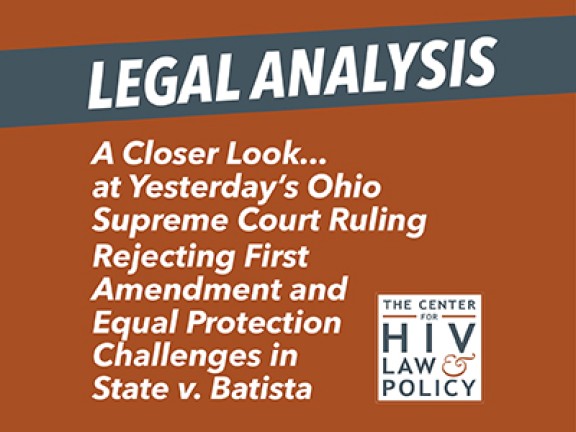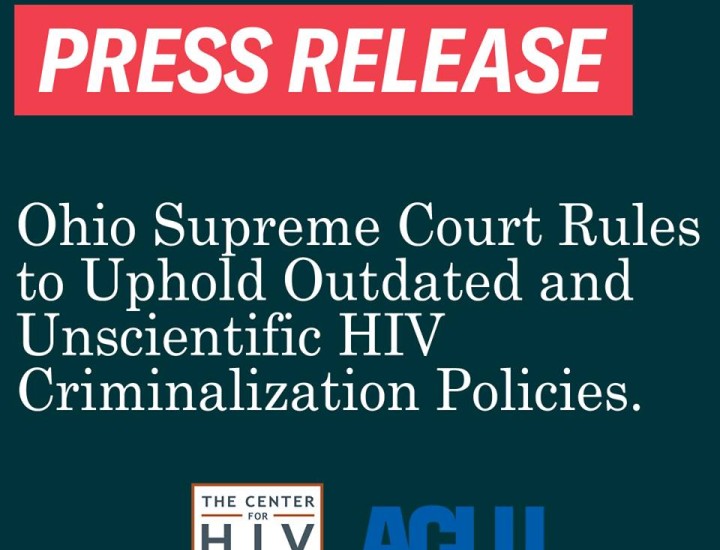Analysis: A Closer Look at Ohio Supreme Court Ruling Rejecting First Amendment and Equal Protection Challenges in State v. Batista (2017)

Analysis: A Closer Look at Ohio Supreme Court Ruling Rejecting First Amendment and Equal Protection Challenges in State v. Batista
by Kate Boulton, CHLP Staff Attorney
On October 26, 2017, the Ohio Supreme Court affirmed Orlando Batista’s conviction for felonious assault under R.C. 2903.11(B)(1), which makes it a serious crime for a person living with HIV to have sex without first disclosing their status to a sexual partner.
The Ohio Supreme Court concluded that Ohio’s HIV felonious assault law regulates conduct, not speech, and therefore does not violate Batista’s rights under the First Amendment of the U.S. Constitution. Although the Court acknowledged that disclosure of HIV status to a partner is a form of speech, it determined that this compelled disclosure is “incidental” to the law’s regulation of targeted conduct, namely sex between a person living with HIV and a sexual partner “who may not be aware of the risk.” Ohio is the third state supreme court to reject a First Amendment challenge to an HIV non-disclosure law in this way.
The Court also rejected Batista’s Equal Protection claim that the law unfairly discriminates against people living with HIV because it concluded that the statute bears a rational relationship to the legitimate government interest of “curbing HIV transmission to sexual partners who may not be aware of the risk.” Under equal protection principles, when a law does not implicate a fundamental right nor a protected class of people, courts will uphold the law if there is some conceivable basis to support the classification and its relationship to the government’s stated policy goal. People living with HIV are not considered to be a protected class under Equal Protection jurisprudence.
The Court thus declined to examine the wisdom of R.C. 2903.11(B)(1) and the lack of evidence demonstrating any linkage between the law and the state’s asserted goal of reducing HIV transmission among Ohioans. Earlier in 2017, a comprehensive review of such laws by researchers at the Center for Disease Control found that they have “no preventive effect.”
In a concurrence, Judge DeWine disagreed with the majority opinion in his finding that the law does implicate the First Amendment. However, he nevertheless concluded that the law is constitutional even under the heightened review of “strict scrutiny,” although he declined to conclude if intermediate or strict scrutiny is the appropriate standard of review. For a law to survive this more rigorous standard of review, it must be narrowly tailored to achieve a compelling government interest and must be the least restrictive means of advancing that interest. Judge DeWine identified two compelling state interests at stake, including the interest in limiting transmission of HIV, but also the state’s interest in “ensuring informed consent to sexual relations.”
The Center for HIV Law and Policy (CHLP) rejects the majority opinion’s assertion that R.C. 2903.11(B)(1) does not impinge on fundamental rights. Mandatory disclosure of a person’s HIV status prior to consensual sex is a clear violation of the right to be free from government-compelled speech. Such a mandate can also put PLHIV, particularly women, at risk of violence from intimate partners. Although not a question before the court, the law also manifestly regulates the most intimate of conduct, and constitutes a profound and extreme violation of the right to individual privacy.
Orlando Batista was originally indicted for felonious assault in 2014 after he engaged in sexual conduct with his girlfriend without first disclosing his HIV status. He pleaded no contest and the court sentenced him to the maximum penalty of eight years. He appealed his conviction, which was affirmed by the First District Court of Appeals in May 2016. The Ohio Supreme Court accepted Batista’s appeal for review in October 2016.
In December 2016, CHLP, with support from the Ohio Public Defender and Gibbons P.C. law firm, along with seven Ohio-based and national HIV, LGBTQ, health professional, and criminal justice organizations, submitted an amici curiae brief to the state supreme court. The brief argued that R.C. 2903.11(B)(1) violates the Equal Protection Clause, but also that it violates prohibitions against disability-based discrimination under the Americans with Disabilities Act and Section 504 of the Rehabilitation Act. However, the argument relating to disability-based discrimination was not raised at Batista’s original trial, meaning it was not an argument available to his defense counsel on appeal.
The decision has important implications for other pending cases in Ohio, including that of Ronald Murdock, who was charged with both felonious assault and murder following the death of his partner earlier this year.
